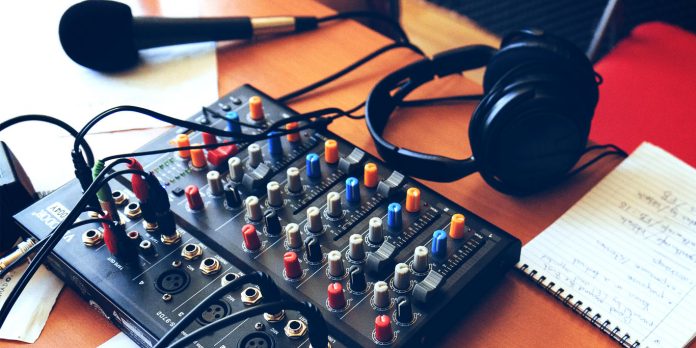Guest post by Dustin Speckman
Making the decision to start recording your own music is an awesome choice. It gives you complete creative control, can save you a ton of money, and most of all, it’s fun!
Before you begin, read through these four tips to make sure you get started on the right foot. You’ll be ready to make great home recordings in no time.
1. Recording gear and software
Minimalism
You’ll have to buy some recording equipment before you can begin creating radio-ready tracks. When you set out to find equipment, you may be scared off by the high price tags of some gear.
Have no fear! You don’t necessarily have to buy a ton of gear or even buy really expensive gear. Today’s “budget” gear is truly high quality and you can get a GREAT sound from it.
The most important thing is to buy only the gear you need and to stick with it.
Consistency
You might be shocked to hear that you should limit yourself. Wouldn’t having a bunch of gear and different options give you an unlimited amount of creative potential?! Well, it can actually make your recordings worse.
It’s kinda like driving a car. You probably drive your car every day. You know exactly how much pressure the gas and brake pedals need for a smooth ride, you know how to turn on all of the features (gotta have those seat warmers on when it gets cold!), you know where all the buttons and knobs are for the AC and radio… you get the point.
Now think back to a time where you borrowed a friend’s car. You probably sped out of the parking lot since you weren’t used to the gas pedal, braked way too hard since the brake pedal acted differently than yours, had trouble turning on the windshield wipers without them going back and forth 2700 times!
So, how did you learn to use all of these tools in your car so well and effortlessly? The answer is consistency.
The more you use one tool or one process, the faster you will become comfortable with them and can get work done with more efficiency and better results.
With all of that said, pick what gear you want to use and stick with it. The results will speak for themselves as you spend more time with your equipment.
2. Recording priorities
You may not realize it, but a good recording is not actually the most important part of recording.
In fact, the recording is maybe only the 3rd or 4th most important thing! So what could possibly come before it?
Your song
Here’s the thing…
You could have the most expensive equipment on earth, the best recording engineers, and the most talented musicians record for you, but if your song isn’t very good or is not finished yet, you would still be disappointed in the results.
A good song transcends any recording quality because if a song is well written and resonates with people, they won’t even be paying attention to the recording quality.
So before you even think about recording, make sure your song is the best it can be and is completely fleshed out.
What does that entail?
Obviously what someone considers a “good song” is subjective, but there are a few things all songs should have before they are ready to be recorded.
[How to build a website for your recording studio]
Is my song ready to be recorded?
First and foremost, your song should be done!
Don’t try to bring in one verse and chorus and half a bridge. You’ll find it very frustrating trying to complete your song while you fuss with recording equipment.
Next, is the arrangement. An arrangement can mean different things for different types of music and genres, and you’ll know best what kind of arrangement works in your genre, but here are a few things to think about.
How does your bass guitar interact with your drums?
How many guitars are playing at once in your track, and what are you doing to make sure they are all heard?
What range do you sing in? Are you making sure no other instruments stomp all over your vocal?
Does the melody of the song come out as the main thing to listen to, or are there other instruments competing for attention?
These are just a few examples of things you should think about before you decide to start recording your song.
Your instrument
This last one is simple. Make sure your instrument is in tip-top shape before you record it.
Change your strings.
Change your drum heads.
Get your guitar set-up.
Rest your voice the night before a recording session.
Fix that knob that has been making that awful scratchy, buzzy noise.
This may seem obvious, but it’s something to look out for. If your instrument isn’t ready to go or has issues, those problems WILL set your recording back. It could directly affect the sound quality or you could waste time trying to fix things during a tracking session.
Let’s record
The more you have to think about while recording, the more your actual recording will suffer. Do yourself a favor and get all of this stuff taken care of ahead of time.
Taking care of your song, arrangement, and instrument beforehand can save you a huge headache.
It will also free your mind up to focus on getting the best sound possible and you’ll have more fun doing it!
Doing these things before your session will set the tone for a great recording and a great final song.
Create a mobile-friendly website for your home recording studio. Try Bandzoogle today!
3. Reference tracks
Reference tracks are a great tool for every aspect of the recording and mixing process. They can really help you nail your sound and give you an idea of what you need to aim for!
What is a reference track?
A reference track is simply a song(s) you choose to listen to to model or inspire your recording. Think about what the sound of your band or project is.
Then, think of 2 or 3 songs that encapsulate what you want your record to sound like.
Be sure to choose something that makes sense! If you’re a bluegrass band, choosing a black metal track probably isn’t going to help you all that much!
Unless you’re some kind of black metal bluegrass group? Hmm…
Anyway!
Analyze your tracks
Once you’ve selected your reference tracks, listen to them very closely and figure out what you like about them.
Also, listen to how things are structured.
Are the drums louder than the guitars?
Does the vocal have a ton of effects on it, or is it clean?
What kind of tones are they using on the bass guitar?
Ask yourself these types of questions as they relate to your genre and your type of music.
How to use this information
Once you’ve analyzed your songs, use it as a guide while you record to find out what types of sounds you should be aiming for in your recordings.
Take this a step further and continue to use it as you mix your music. Check back to see how your balance compares to the pro track. Let it guide you to make sure your track stacks up to a professional mix.
A reference track is one of the most helpful things you can use while recording and mixing, but be sure not to fall into the trap of trying to copy the song sound for sound, and level for level.
We simply want to draw inspiration and knowledge from the track.
If the guitars are distorted, don’t spend 9 hours figuring out what guitar, amp, pedal, and strings the guitarist used. Instead, just make a note that you should look into using distorted guitars.
This will ensure that your track still retains your personal charm and touch, but also ensures that it can compete and sounds just as good as other pro-level recordings!
4. Setting deadlines
Before you even press record for the first time, commit to finishing your project! New recorders and mixers often get hung up on small details or areas where they haven’t perfected their skills yet.
It’s okay if you haven’t mastered every skill after your first recording, what’s most important is that you go through the whole process and have something to show and release at the end.
The importance of finishing your songs
It’s important to power through and finish your songs for a variety of reasons.
As a band or musician, it’s great to have something to offer your fans and new listeners. Most people aren’t going to care if it’s perfect, or if that tambourine is just a little too loud.
They want to hear your songs!
You’ll have more tracks to record and mix and you’ll get better each time.
As for developing your ears for recording and mixing? The more projects you work on, the more experience you’ll get and the faster you’ll improve.
Avoid getting caught up in one project trying to perfect it and make it the best thing that’s ever existed! I’m not saying to not care or be dismissive of it, but do your best work and then move on.
As you move through songs and new recordings, lessons learned from your prior projects will inevitably help you out with your new projects.
So really, it’s a win-win! More music finished and released for your fans and you get more experience to improve your recording and mixing!
Set deadlines
If you’re a DIY or independent musician, you probably don’t have a label breathing down your neck to tell you when to finish your record. You might be surprised to hear that a deadline can give you the motivation you need to finish projects and move on.
A deadline (even an artificial one) gets you in the mindset of getting the work done in the time you set for yourself.
If you set no time limit, you’ll just meander through each step and never really finish anything!
However, if you set a deadline of 30 days to record your band’s next single, you’ll automatically start thinking about scheduling everything out.
How long will the drums take?
Guitars?
How long to mix?
How long to create the artwork?
Now you can create a schedule. Stick to this schedule and finish your tracks! Treat the deadline like an important part of your process and you’ll find that it makes things much easier to finish.
If you’re feeling bold, plan a release party or show for your new project or announce the date for your new album.
This will give you a real incentive to deliver and will help you avoid procrastination and indecision.
Focus on the things that matter and get to recording!
Wrapping-Up
There is a lot that goes into home recording, but if you keep these lessons and examples in mind, you’ll have a much easier time.
Take what you’ve learned and apply it to your next project and keep going!
Dustin Speckman is an audio engineer from California. He is also the Operations Manager at Musician on a Mission, the place where musicians go to learn about home recording and mixing.








